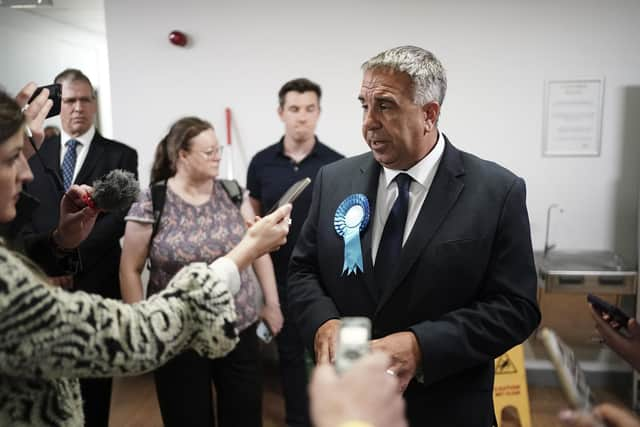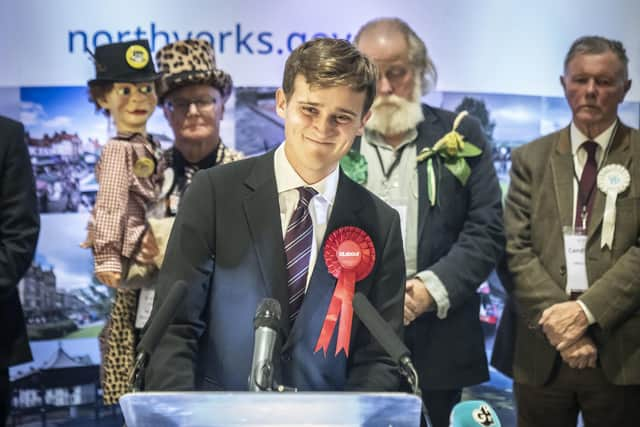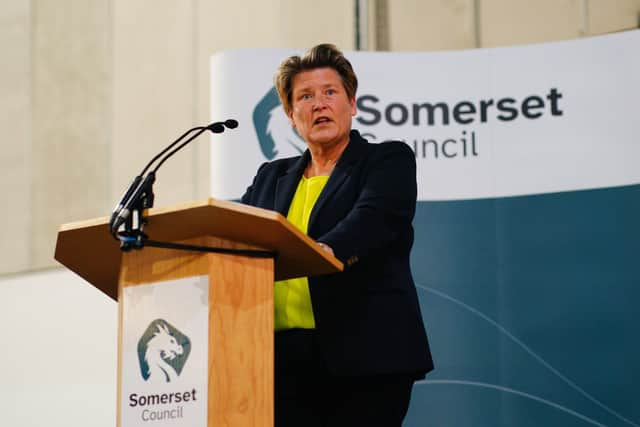By-election results: What pollster Sir John Curtice has to to say as the Conservatives suffer huge losses in English by-elections - but narrowly hold on to Boris Johnson's old seat
There are questions for both the Conservatives and the Labour Party after surprising by-election results in England.
The Conservatives suffered two heavy defeats, but narrowly managed to hold on to Boris Johnson’s old seat.
Advertisement
Hide AdAdvertisement
Hide AdThe Lib Dems overturned a Conservative majority of 19,000 in Somerton and Frome and Labour overturned a 20,137 majority in Selby and Ainsty. But in a setback for Labour, the Conservatives held on to Uxbridge and South Ruislip by just 495 votes, despite a 6.7 per cent swing to Labour.


Do these results show the Conservatives are in hot water going into next year’s general election?
Taking the three results as a whole, it shows a 21.4 per cent average swing away from the Conservatives. And pollster Professor Sir John Curtice says the party is now in “deep electoral trouble”.
“Taken in the round, these by-election results do suggest that the Conservatives remain in deep electoral trouble, as opinion polls have been telling us,” he told BBC Radio 4’s Today programme.
“Although Uxbridge will provide Rishi Sunak with some immediate cover, in the end the message from these by-elections is that the Conservatives are indeed in considerable electoral trouble along the lines that the polls are suggesting.”


Labour was expected to win the London seat of Uxbridge and South Ruislip, which was previously held by former prime minister Boris Johnson. And it seems a local issue is what decided the result on the night, as opposed to warm support for Mr Sunak and the Conservatives.
It does mean the Labour Party may need to go back to the drawing board on their campaigning in key Conservative seats.
Prof Curtice said: “This was the one surprise of the night. We did think Labour ought to have won this seat, only a 7.5 per cent swing was needed.
Advertisement
Hide AdAdvertisement
Hide Ad“But Labour fell somewhat short and if you accept the explanation of the Conservative victor, the primary argument is about Sadiq Khan’s proposals to extend the ultra low emission zone to outer London areas, which Uxbridge is part of. The Conservatives campaigned strongly on that.


“Voters have not offered evidence they think Rishi Sunak is doing a good job. It is maybe not the whole explanation, but it was enough to make a difference to the outcome.”
This is perhaps not so much the case when it comes to the Yorkshire seat of Selby and Ainsty. This rural seat was considered a safe Conservative seat, as they have held it since 2010.
But Keir Mather, 25, has become the youngest MP in the House of Commons after securing 16,456 votes, breaking the record for the largest Conservative majority overturned by Labour since 1945.
Mr Mather said his party had “rewritten the rules on where Labour can win”. This could be more where we see genuine popularity for the Labour Party at the polls.
Prof Curtice said: “Here is evidence the electorate, for the most part, is enamoured with the Labour Party. In Selby, there was a swing of around 24 points, which is the second highest swing record in any by-election.
“You have to go to by-elections in the 1992-1997 Conservative government to find anything comparable.”
Meanwhile the Lib Dems look as if they are gaining back parts of their former stronghold of south-west England, after Somerset councillor Sarah Dyke won the Somerton and Frome seat with 21,187 votes. The Conservatives came second with 10,179 votes.
Advertisement
Hide AdAdvertisement
Hide AdThis comes after the Lib Dems took the nearby seat of Tiverton and Honiton seat last year from the Conservatives, and took control of Somerset Council.
In her winning speech, Ms Dyke thanked “life-long Conservative voters” and Labour and Green voters who had lent her their votes. Tactical voting like this could be seen in all three by-elections in a bit to try and oust as many Conservative seats as possible.
Prof Curtice said: “The Lib Dem vote fell in Selby and in Uxbridge, and the Labour vote fell very heavily in Somerton, from 12 per cent down to 2 per cent. So baring in mind previous by-elections, voters are minded to vote for whoever is best placed to defeat the Conservatives.”
Having avoided a complete embarrassment, Mr Sunak said the by-election results showed the next general election was not a “done deal”, despite losing two safe seats.
He said: “By-elections for an incumbent government are always difficult – they rarely win them. The message I take away is that we’ve got to double down, stick to our plan and deliver for people.
“That’s what I heard when I was out on the doorsteps and that’s what we’re going to do. We’re going to work incredibly hard to deliver on our five priorities and earn people’s trust for the next election.”
The Prime Minister added: “Westminster’s been acting like the next election is a done deal. The Labour Party has been acting like it’s a done deal, the people of Uxbridge just told all of them that it’s not.
“No one expected us to win here, but Steve’s victory demonstrates that when confronted with the actual reality of the Labour Party, when there’s an actual choice on a matter of substance at stake, people vote Conservative.”
Advertisement
Hide AdAdvertisement
Hide AdMr Sunak’s optimism hasn’t put a damper on the opposition bench’s spirits. Labour leader Sir Keir Starmer said if they see similar swings across the country in a general election as they have done in these by-elections, the party would win more seats than Tony Blair’s 1997 landslide.
He said: “This is a historic result that shows that people are looking at Labour and seeing a changed party that is focused entirely on the priorities of working people with an ambitious, practical plan to deliver.
“It is clear just how powerful the demand for change is. Voters put their trust in us, many for the first time.
“After 13 years of Tory chaos, only Labour can give the country its hope, its optimism, and its future back.”
But what does all of this mean for Scotland, particularly when you bring the SNP and the question of Scottish independence into account?
Scottish Conservative chairman Craig Hoy MSP doesn’t seem particularly worried about the results south of the border. He said it was a “very good result”, despite his party losing tens of thousands of votes.
He said: “There is no great appetite for Labour – Conservative voters stayed at home rather than switching to Labour, so the next election is not a foregone conclusion.
“Scotland could be pivotal in the seats we hold in Scotland, where it is a straight choice between the Scottish Conservatives and the SNP.
Advertisement
Hide AdAdvertisement
Hide Ad“It is a very different dynamic in Scotland and I don’t think anything has gone wrong for us in Scotland. We are putting up a strong performance with a good team in Holyrood.”
Meanwhile Scottish wellbeing economy secretary Neil Gray MSP said the results were positive for the SNP going into the next general election.
Speaking on BBC Good Morning Scotland, he said: “The Conservatives lost two seats in their heartland areas, and Labour was widely expected and tipped to take Boris Johnson’s former seat, so there will be disappointment in both camps.
“At the next general election we want to see the back of the Conservative government, but Keir Starmer is making U-turn after U-turn, most recently on social security by accepting the Tory policy of the two child benefit cap and the rape clause. The only change is by voting SNP at the next general election and then onto independence.”
Comments
Want to join the conversation? Please or to comment on this article.